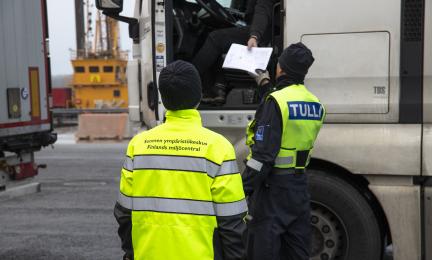Supervision and inspection of transfrontier shipments of waste

Supervision of shipments of waste
Several different authorities are involved in the supervision of international waste shipments in Finland. The Finnish Environment Institute monitors international waste shipments in cooperation with parties such as Customs and the police. In addition to transport inspections carried out at ports and border crossing points, controls are focused on exports of electronic waste and end-of-life vehicles outside EU countries. Both the Finnish Environment Institute and the environmental authorities supervising companies carry out corporate inspections related to international waste shipments. The supervision of waste shipments is based on the regulation on shipments of waste and the Waste Act.
In order to improve supervision, the Finnish Environment Institute is involved in the European Union's IMPEL – Waste and TFS projects, which aim to develop and promote audit activities in EU Member States. IMPEL is a cooperation network supporting the implementation of EU environmental legislation.
Inspection plan for international shipments of waste
The Finnish Environment Institute has prepared an inspection plan for the supervision of waste shipments. The aim of the plan is to ensure that international waste shipments are carried out in accordance with regulations and instructions, to prevent illegal waste shipments and to ensure that waste is handled appropriately.
The plan concerns inspections of facilities and companies whose operations involve or may reasonably be expected to involve international shipments of waste. The inspection plan is updated every three years or even earlier where necessary.
Inspection plan for international shipments of waste 2023-2025 (in Finnish) (pdf, 315.83 KB)In the EU, efforts have been made to reinforce supervisory practices in waste management in general and, in particular, in waste shipments through systematic inspections. The regulation on shipments of waste requires Member States to draw up an inspection plan. The Waste Act also contains an obligation to draw up an inspection plan.
What is illegal waste shipment?
The regulation on shipments of waste sets requirements for international waste shipments. If the requirements are not complied with, the shipment may be considered illegal. Illegal shipments of waste may include:
- a shipment of waste requiring notification without a waste shipment permit
- a shipment of waste requiring notification without the approval of all competent authorities
- Exports of waste for disposal outside the EU or exports of hazardous waste for recovery to non-EFTA, non-EU or non-OECD countries.
- a waste shipment not carried out as indicated in the waste shipment notification
- a waste shipment approved based on incorrect information
- a waste shipment where the environmental performance of the recovery or disposal facility in the receiving country does not comply with international regulations.
The illegal shipment of waste is defined in Article 2(35) of the regulation on shipments of waste
A so-called green waste shipment may also be illegal, for example, if the shipment takes place without Annex VII of the regulation on shipments of waste, or if the shipment is carried out in a different manner than that set out in Annex VII.
Illegal shipment arrangements
When a competent authority detects an illegal shipment of waste, it shall immediately inform the other competent authorities concerned.
The primary responsibility for illegal shipments of waste lies with either the notifier (exporter) or the consignee. The authorities in the country of origin and the destination country agree on the form of take-back of the waste and the organisation of waste treatment.
Cost of illegal shipments of waste
The costs related to the take-back and treatment of waste are borne either by the waste exporter (notifier) or the consignee.
Reporting on waste shipment inspections and illegal waste shipments
The regulation on shipments of waste obliges EU Member States to report on inspections and illegal waste shipments to the European Commission. The last national report on waste shipment inspections and illegal waste shipments in accordance with Section 51(2) of the Waste Shipment Decree was made for the reporting year 2023.
Report under article 51(2) regulation on shipments of waste (pdf, 172.29 KB)More information
Export and import of used products
Used products such as vehicles, tyres, spare parts or electrical and electronic equipment